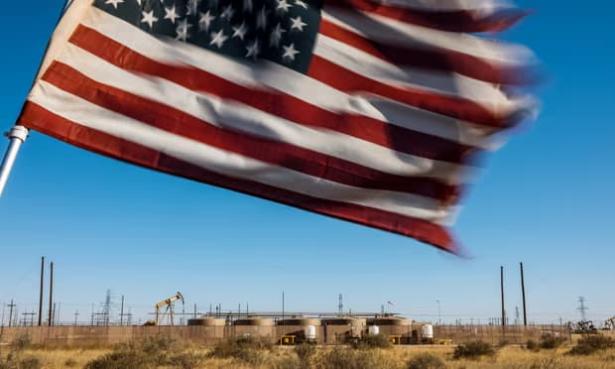At the close of the hottest year in history, delegates from around the world gathered at climate talks in Dubai in December and agreed, finally, on one thing: that the time had finally come for “transitioning away from fossil fuels in energy systems, in a just, orderly and equitable manner”. It was the first time in three decades of climate negotiations that diplomats had used the F-words, and it seemed like a breakthrough of sorts.
Now we’re going to find out if they meant it.
The president of the United States – which is the biggest fossil fuel producer on planet Earth – is poised to make a decision: should his government keep on granting export licenses to companies that want to build new terminals to send liquefied natural gas (LNG) around the world. The potential scale of this buildout is almost unbelievable. The US is already the biggest gas exporter on Earth, but if the industry gets what it wants, the LNG it exports each year will be enough to power half a billion homes. It will produce more greenhouse gases than everything that happens in Europe. Bloomberg this week called it “the world’s final wave of fossil-fuel megaprojects”. It’s the ultimate lock-in to dirty energy.
Biden could block all that, simply by halting the licensing process while the Department of Energy recalculates its old formulas for what constitutes the “public interest”. If his government meant what it signed in Dubai it has no choice (and former secretary of state John Kerry was instrumental in inserting that language). But the fossil fuel industry is engaged in a last-ditch effort to storm ahead with this boondoggle. And they’re using Europe, and Ukraine, as their excuse.
After Putin’s invasion of Ukraine, Europe did need some short-term supplies of gas to make up for what it was no longer getting from Russia. The US supplied much of it – it already has sufficient export capacity. And now, Europe is swimming in natural gas. But that doesn’t stop big oil: here’s the head of the American Petroleum Institute complaining that any slowdown in the fossil fuel buildout would somehow be a stab in the back. “The signal that sends to our allies is very, very concerning: is the United States going to be a source of LNG and a reliable partner into the future?”
In fact, America’s partners in Europe are now about the business of replacing gas with renewable energy – Germany last year saw its lowest fossil fuel use in many decades. The International Energy Agency forecast this week that Europe will need steadily less gas over the years ahead, not more. As Ana Maria Jaller-Makarewicz, an analyst for the Institute for Energy Economics and Financial Analysis said recently: “The decline in gas demand is challenging the narrative that Europe needs more LNG infrastructure to reach its energy security goals. The data is showing that we don’t.”
The move to renewables comes in part because it makes economic and climate sense (we live on a planet where the cheapest way to make power is to point a sheet of glass at the sun) and in part because everyone knows that as long as we remain dependent on fossil fuels, the countries that control those supplies have too much power. That’s obvious with Putin, but why would Europe want to depend on, say, an America ruled by the Republican frontrunner Donald Trump?
All of this makes clear that a new export facility permitted now, which will be built over the next five years and in service for the next 50, won’t have anything to do with Ukraine or Russia or Europe. Instead, the cargoes are bound for Asia – where new analysis shows they will displace sun and wind energy, prolonging the climate crisis. And prolonging the plague of fossil fuel pollution both along the Gulf coast and in the countries where it’s eventually burned – one death in five on this planet comes from breathing the combustion byproducts of fossil fuel. The combustion associated with solar power, by contrast, happens 93 million miles up in the sky.
Americans don’t want their country fracked to provide cheap gas for China, and Europeans and Ukrainians don’t want to be used as a justification for the climate crimes – and the environmental racism – now under way in the Gulf of Mexico.
The obvious alternative is for countries to work together to spread renewable energy everywhere – in windy Ukraine as it is rebuilt after the war, and in the sun-drenched countries of the global south. Germany – not exactly a tropical nation – now gets more power from the sun and wind than from coal. This isn’t impossible. But it does mean standing up to business as usual. Our diplomats need to realize that security comes, above all, from a stable and working planet, and that we are running out of time to secure that stability; 2023 was the hottest year in the last 125,000, and 2024 is likely to be hotter still.
Those state department officials pushing the Ukraine excuse as a rationale for expanding gas need to talk with their counterparts who were at Dubai, and face the fact that American foreign policy can’t go in two directions at once. Either we’re serious about transitioning off fossil fuels or we’re not, and Joe Biden gets to make the call.
-
Svitlana Romanko is the founder of Razom We Stand, working to win the war in Ukraine and rebuild the country with green energy
-
Bill McKibben is the founder of Third Act, which organizes Americans over 60 for action on climate and democracy
-
Luisa Neubauer is the author of Beginning to End the Climate Crisis: A History of our Future


Spread the word